Whenever I post pictures of our dedicated home art space on my Instagram account, there will always be comments and messages asking what are the “must-have” or “best art supplies” for toddlers when starting to stock an art trolley or an art space for the first time.
There are a bazillion art supplies for kids out there so I get the overwhelm when you are just starting out. First things first, let me just say from the get go that mess is inevitable when children are learning to develop their fine motor skills when using the art supplies.
Mess will happen when they want to use ALL the materials when trying to explore what each material can do. It comes as a result of trying to create and problem-solve. And finally, mess is part of all the wonderful learning that is happening when children are deep in their creative zone exploring and creating.
When you look beyond the mess and equate mess with learning, it might be easier to embrace a fully accessible art space and all that comes with it.
Having said all that, there are definitely some strategies with regards to the art materials that you can put in place to minimise and manage (not eliminate) mess. I talk about it more specifically in this post where I outline the thought process behind setting up our art space, however there are certain things you can do to help reduce any mess-induced stress.
Table of Contents:
- Top tips for managing mess
- Art medium for toddlers for drawing or painting
- Craft supplies for crafting and creating
Top Tips for Managing Mess
- Choose materials that are relatively mess-free. Obviously don’t start with something like glitter, or NEVER use glitter if a material like that causes you to break out into nervous hives.
- Limit the variety that is out and simply rotate the materials more often. Children don’t need 20 over items overflowing on the art trolley to get creative. 3-5 different supplies works too.
- Start small. If you’re only just dipping your toes into having art materials available to your children 24/7, limit the amount of each variety out. You don’t need an entire container filled with colours pencils or crayons. 5-10 pieces of each item works too so if you have a child with a penchant for tipping everything out, the tidying up still wont be overwhelming for you or your child. A little goes a long way.
- And as with everything else, teach, give clear expectations and provide boundaries for appropriate use of materials and follow through with consequences
Now without further ado, here’s a list of our Top 13 art and crafts supplies for toddlers that encourage creativity with limited mess
(For your convenience, this list contains affiliate links.)
Art medium for toddlers for drawing or painting
1) Dot Markers
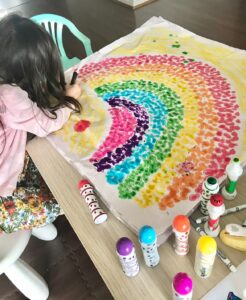
Dot markers are like a mess-free option to paint. It’s vibrant and easy for toddlers to use, all without the consequence of paint dripping and getting everywhere. Whilst dot stickers are my favourite resource on our art trolley, dot markers are definitely both my older children’s favourites seeing as they each make several pictures using these every single day.
I’m not really one for printables as I’m more of an encourage process art and open-ended art kind of mum but if these are your jam, a quick search on Pinterest for Dot Marker printables will result in a heap of them, perfect for adding to your art trolley/space.
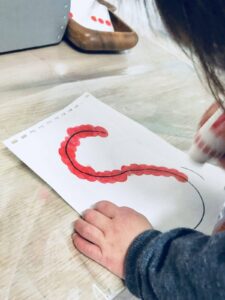
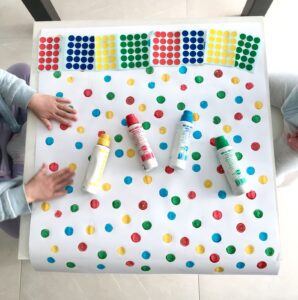
2) Paint Sticks
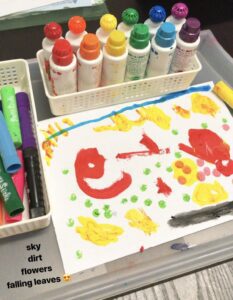
For another alternative to paint, you cannot go past tempera paint sticks. These work like glue sticks so the amount that comes out is very much controlled. We got ours from Daiso and these come in a set of standard bright colours, neon colours or metallic colours. The vibrant colours glide across paper easily, so you get the brilliant effect of paint using a tool that can be used like crayons. Big tick!
3) Ikea Mala Paints
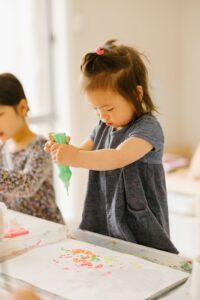
Now I know paint doesn’t exactly say mess-free but if you do want to give that option of free access to paint to your toddler like I did, Ikea Mala paints are definitely your paint of choice.
I love that these bottles allow my toddlers to exercise independence in setting up a painting session for themselves. They are able to unscrew the caps of the bottles, squeeze the paint out and then screw the caps back all on their own. No set up on my part, no palettes, brushes or cups to wash at the end, no mess to clean up PLUS all that fine-motor goodness squeezing the bottle, unscrewing and screwing bottle caps.
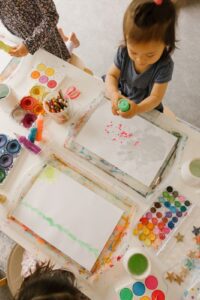
For activities that were supervised, I started off with Crayola Washable Paints. They are amazing, washes easily and I’d highly recommend them. But for something that will be slightly less messy, these are my go-tos. You can do finger painting with these washable paints too. I have compiled 7 paint invitations for toddlers and preschoolers with minimal set up time.
(Word of Caution: Toddlers will take great pleasure in squeezing copious amounts of paint when they are first introduced to this paint medium so supervise, supervise and SUPERVISE!)
4) Watercolours Palette
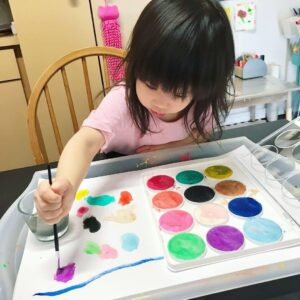
This is hands down, the best art supply for us when it comes to painting. The colours are so beautiful and vibrant on paper. A palette is also such a handy tool to contain ALL the mess that comes with painting as it is incredibly easy to set up and pack up.
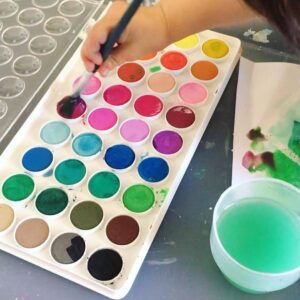
We absolutely love our 36-disc watercolour palette and a 12-disc jumbo palette which are both from Micador, but whilst the 36-disc palette might be more suited to a preschooler with more developed fine-motor skills and good control of their wrist, the 12-disc jumbo palette is perfect for a toddler who is just starting out.
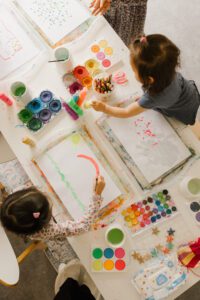
I highly recommend the 6-disc solid tempera paint palettes, which are available in four options: warm, cool, primary, and neon colours. These palettes are perfect for children to explore and experiment with colours.
Note: This is probably the only art supply on this list that requires more parental guidance at the start in terms of teaching your children how to use them properly i.e. without mixing colours. When I first introduced this to my toddler back then, I was on hand the whole time to teach and model the correct way of using the palette. I repeated the rules that we don’t mix colours and we wash the brush between each colour almost every 5s (even till this day, I STILL have to remind every now and then even though she is now 3).
Pro Tip: I also taught her to count to 10 while getting paint from the palette to ensure that she got enough colour on her paintbrush. Toddlers and even preschoolers are usually quite excited about this medium and in their excitement, most just quickly rub the wet brush once over the disc and bring it to the paper only to get disappointed that the effect is more water than paint. By counting to 10 while rubbing the disc for paint, it helps to transfer more paint to the paintbrush and results in a more vibrant colour on paper. Bonus points for getting to practise counting!
5) Washable Markers
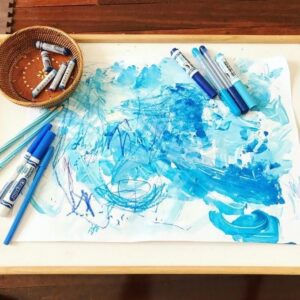
This would be my choice over colour pencils just because when a toddler is introduced to art materials for the first time, you want to set them up for success and you want to get them excited about creating art so they will want to keep going back to the art space. With colour pencils, it is so challenging to exert the correct pressure when using it on paper. Too soft and the colour is barely noticeable, too hard and the tip easily breaks.
Washable markers on the other hand are the perfect markers for kids, almost like the “baby bear” tool that I bet Goldilocks will approve. But I know I know. What about our walls and floors?? Which is why I highly recommend washable markers and ours are from Crayola.
6) Oil Pastels
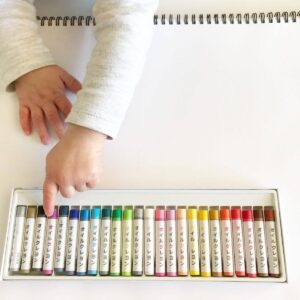
As per the above, this would be my choice over crayons for the exact same reason. Bonus points for the option to do activities like a watercolour resist activity, or a dabbing oil over oil pastels with Q-tips activity to get a creamy paint-like effect.
Our set of oil pastels is from Daiso so they are extremely affordable but honestly so AMAZING!
Craft supplies for crafting and creating
7) Dot Stickers
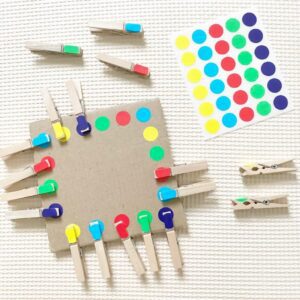
Dot stickers are a fantastic starting point for any beginner’s art trolley. They’re incredibly versatile and suitable for various age groups:
- For Toddlers: The simple act of peeling off and sticking dot stickers to paper or cardboard is a great way to develop fine motor skills.
- For Preschoolers: Use dot stickers to create pictures, trace pre-writing patterns, or learn shapes and colours. The best part? These are 100% mess-free!
8) Washi Tape
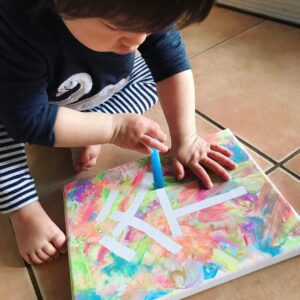
I honestly don’t even know where to start describing my love for this one. They come in all sorts of beautiful textures, colours and patterns, tears easily and adheres to all kinds of surfaces without leaving behind any sticky residue. There are also so many possibilities for using it including and not limited to tape-resist art, creating borders, sculptures and various 2D art. ‘Nuff said!
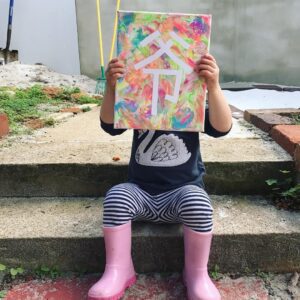
9) Paper
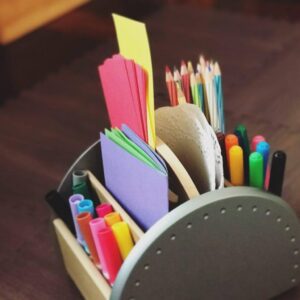
This is probably a given but do you know that there isn’t just one type of paper you can provide in the art space? Rotating through a variety of different paper types keeps the art area looking exciting, fresh and inviting. Some of the types of paper I’ve offered in the art area include recycled paper (perfect for toddlers who are just starting to scribble and go through stacks of paper every single day), coloured construction paper, post its, lined paper, watercolour paper, paper doilies and a roll of easel paper.
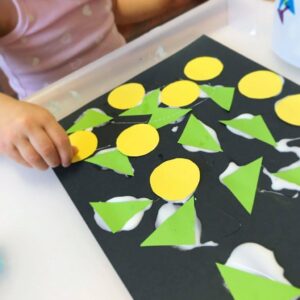
Another way to keep things interesting is to offer paper cut into different sizes and different shapes, so for instance paper that is cut into A5 or A6 besides the regular A4 size, or paper that is cut into a circle, or different tiny shapes, just as different prompts for inspiring new ideas and creativity. I’ve gathered some fun invitations to create just for you.
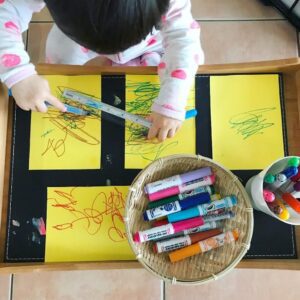
10) Scissors
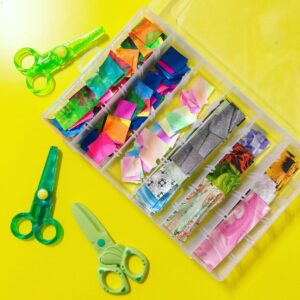
I consider scissors an essential tool in the art area, especially for toddlers who are curious about cutting and eager to explore. They provide countless opportunities for creative expression.
When I invite my toddler to experience the joy of creating a paper collage or mosaic, I always ensure that scissors and a stack of colourful papers are on hand. Allowing them to cut and prepare their own pieces is a delightful way to foster their creativity.
For those with younger children at home, I recommend offering only child-safe scissors.
11) Glue
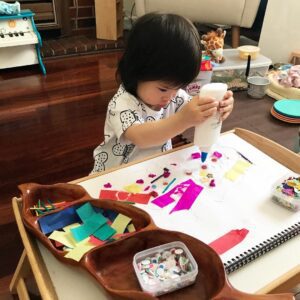
Another resource that is considered a basic tool for an art table. I personally provide both glue sticks and Elmer’s white glue that comes in a squeezy bottle, but if the idea of excess amounts of glue being squeezed out and going everywhere scares you, simply stick to a glue stick.
Pro Tip: Elmer’s glue stick comes on purple and dries clear, perfect for indicating to toddlers where they need to stick their craft materials on before it dries.
12) Play dough
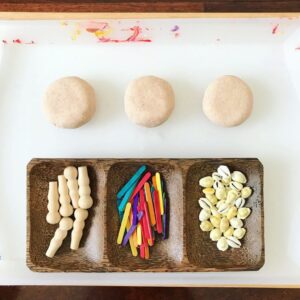
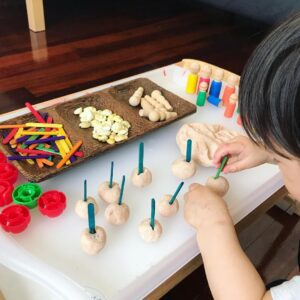
Play dough is definitely one of the most versatile and open ended materials ever. It is wonderfully sensory, is fantastic for developing fine motor skills, creativity, imagination and is also useful for exploring various cognitive concepts.
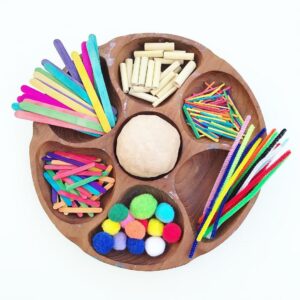
Offer it on its own or with different props and loose parts like popsicle sticks, pipe cleaners, pom-pom balls and googly eyes as an invitation to play, natural or coloured, smooth or textured, with or without scent. The possibilities are truly endless.
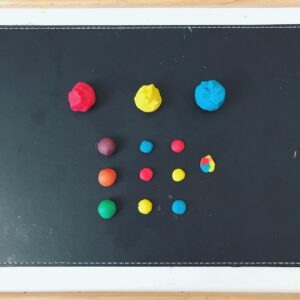
13) Recyclables
Finally, in my opinion, there is no better way to encourage children’s creativity than to offer a variety of recyclables in the home art area. Besides sparking off conversations about taking care of our environment, encouraging children to look at recycled materials and find creative ways of re-purposing them, you will find that these items will often spark YOUR own creativity in re-purposing them to make activities for your children like the matching activity above.
I love the endless possibilities of recyclables so much that I have intentionally placed our home recycling bin next to our art area. Some of the recycled materials we have on offer include cereal boxes, tissue boxes, cardboard (cut out from packages), toilet paper rolls, cardboard rolls, bubble wrap, egg cartons, milk cartons etc.
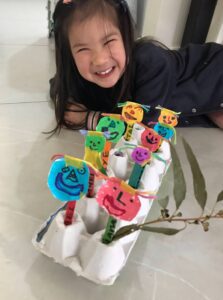
In conclusion
Selecting the right tools and materials is so important for laying the foundation for children to have a positive experience and therefore positive outlook to engaging in creative activities in a home art area. Children can and should be trusted with good quality materials and it’s only when we give them access to good quality resources and TEACH them how to respect them that they will develop the care and respect towards materials we want them to have.
Toddlers are gonna get messy and dirty. They’re gonna get stains on themselves and probably every other surface within sight and touch. They are still learning how to hold and manipulate materials and if we don’t give them the chance to freely explore, they won’t have the opportunity to learn.
I hope that this post has given you some ideas of how you can provide quality art materials to toddlers in order to encourage creativity with as little mess as possible. But even if it ends up a big giant MESS, please remember that it’s nothing a couple of baby wipes/ a wet cloth / a shower can’t fix. Happy creating! 🙂
Ps. If you want to dive into the world of process art and want some fun and engaging process art activities for your family, Check out Little Art Yurt Club here 🙂
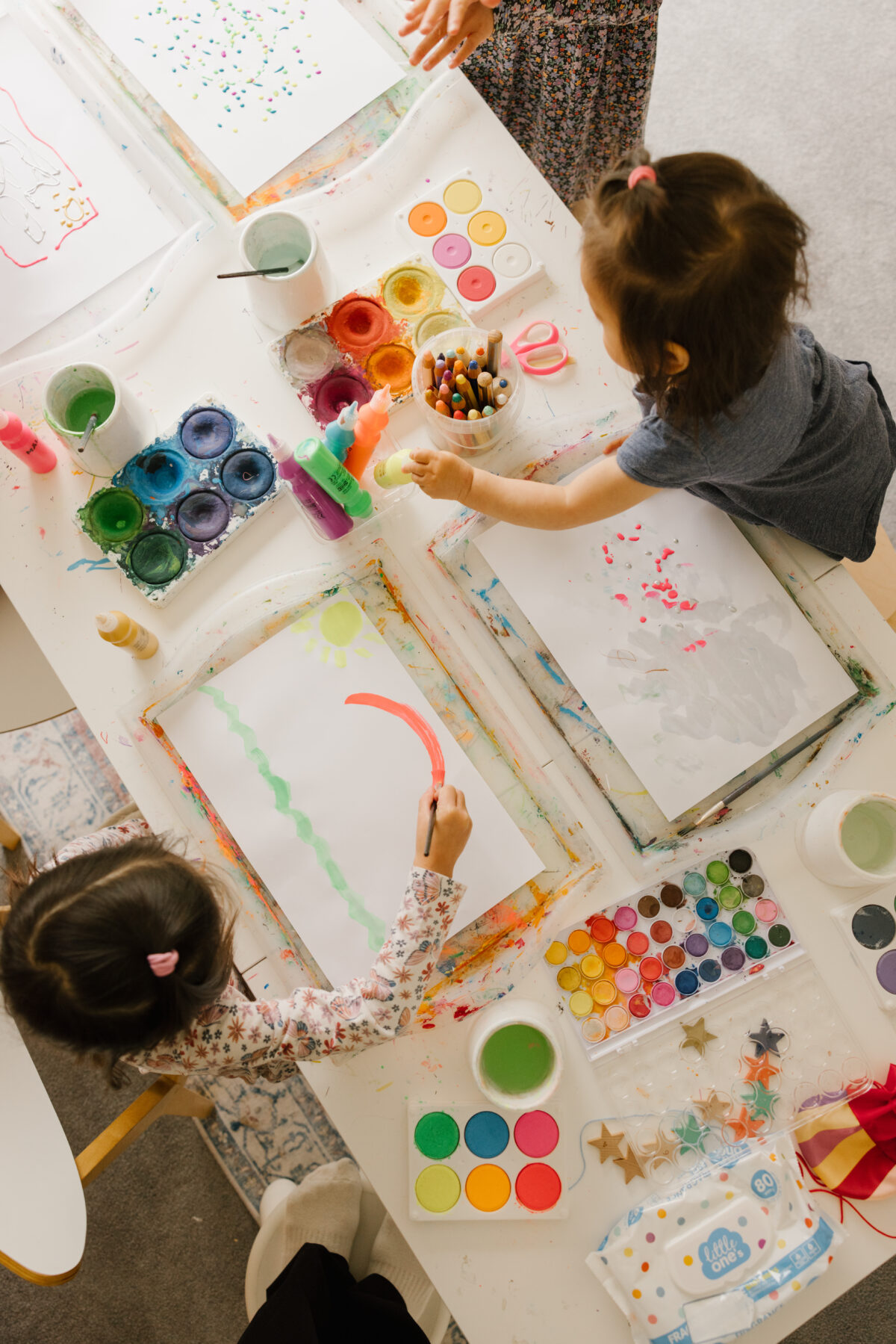
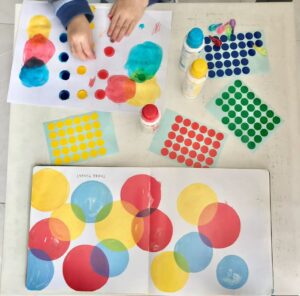
View comments
+ Leave a comment